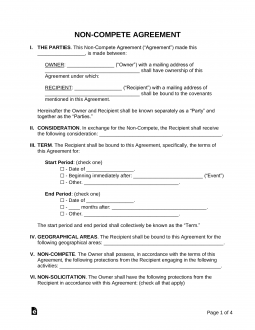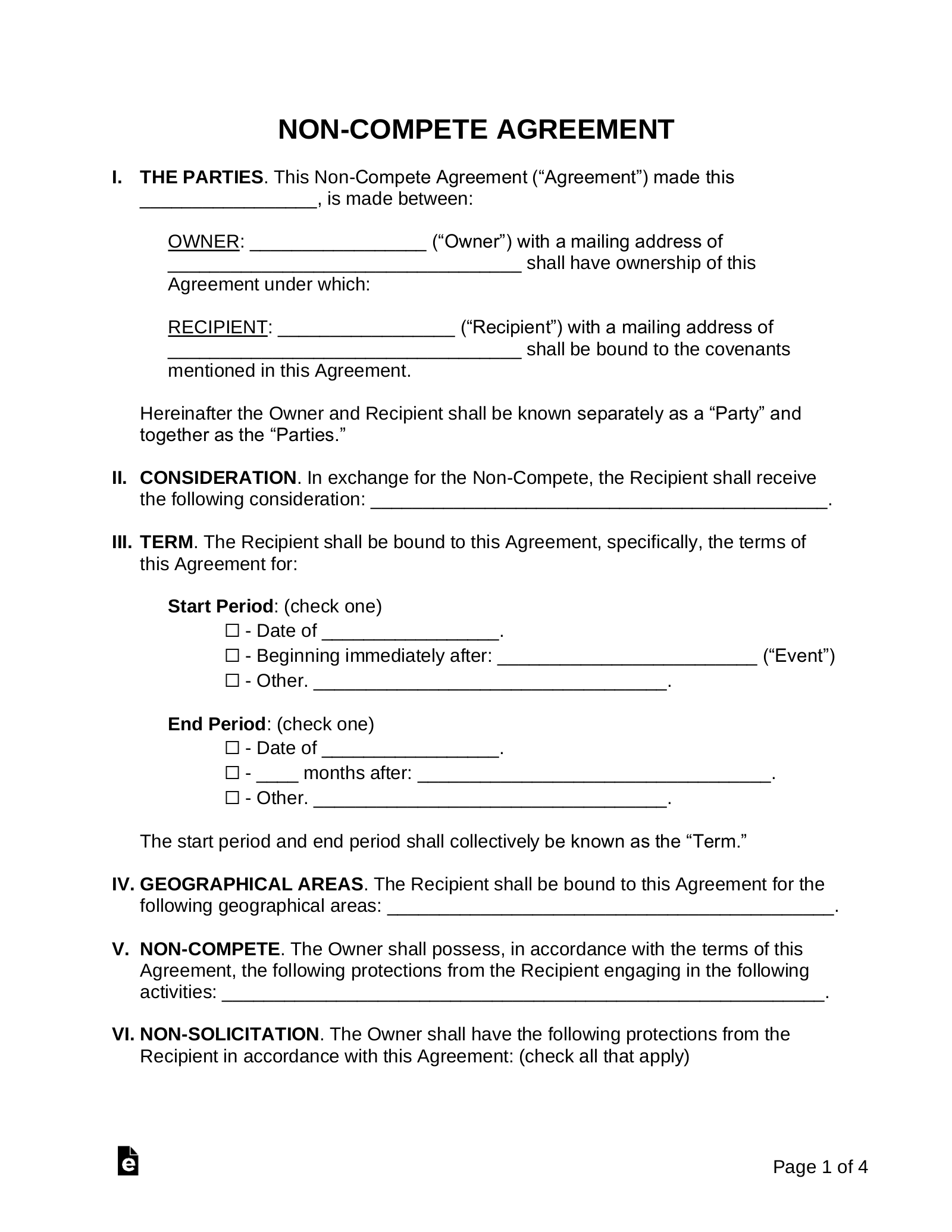Updated February 16, 2024
A non-compete agreement prohibits someone from working in the same business (or line of work) for a specific time period and geographical area. A non-compete is commonly used for employment purposes, the sale of a business, and partnership dissolution.
Is it Legal?
- A business sale non-compete is legal in every state.
- An employee non-compete is legal in every state except:
- California (BPC § 16600)
- North Dakota (§ 9-08-06)
- Oklahoma (Title 15, § 219A)
- Washington D.C. (D.C. Law 23-209)
Common Uses
- Hiring employees
- Hiring contractors
- Selling a business
- Starting or dissolving a partnership
- Looking for real estate
By State
- Alabama
- Alaska
- Arizona
- Arkansas
- California
- Colorado
- Connecticut
- Delaware
- Florida
- Georgia
- Hawaii
- Idaho
- Illinois
- Indiana
- Iowa
- Kansas
- Kentucky
- Louisiana
- Maine
- Maryland
- Massachusetts
- Michigan
- Minnesota
- Mississippi
- Missouri
- Montana
- Nebraska
- Nevada
- New Hampshire
- New Jersey
- New Mexico
- New York
- North Carolina
- North Dakota
- Ohio
- Oklahoma
- Oregon
- Pennsylvania
- Rhode Island
- South Carolina
- South Dakota
- Tennessee
- Texas
- Utah
- Vermont
- Virginia
- Washington
- Washington D.C.
- West Virginia
- Wisconsin
- Wyoming
By Type (3)
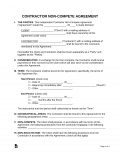 Independent Contractor Non-Compete Agreement – Allows a business that hires a contractor to prohibit them from working in the same scope of work.
Independent Contractor Non-Compete Agreement – Allows a business that hires a contractor to prohibit them from working in the same scope of work.
Download: PDF, MS Word, OpenDocument
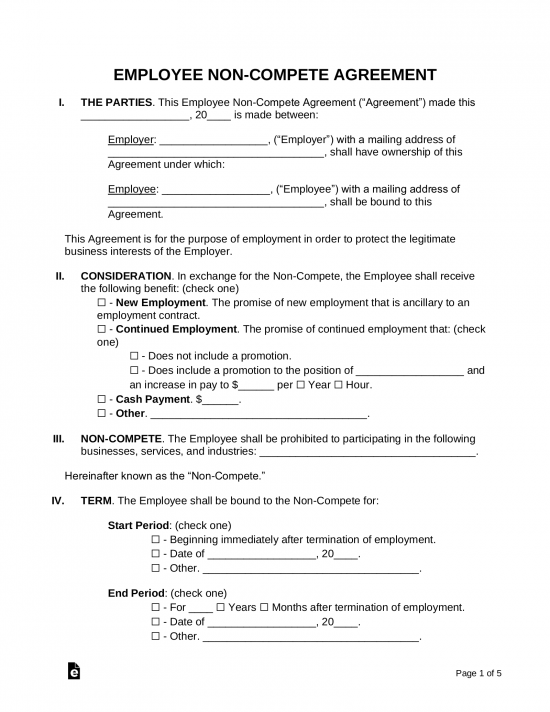 Employee Non-Compete Agreement – Protects an employer from an employee using learned trade secrets against them.
Employee Non-Compete Agreement – Protects an employer from an employee using learned trade secrets against them.
Download: PDF, MS Word, OpenDocument
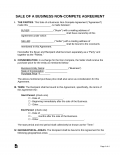 Sale of a Business Non-Compete Agreement – Allows a buyer to protect themselves by requiring the seller not to compete in the same business being purchased.
Sale of a Business Non-Compete Agreement – Allows a buyer to protect themselves by requiring the seller not to compete in the same business being purchased.
Download: PDF, MS Word, OpenDocument
Table of Contents |
Requirements (5)
- Legitimate interest. The purpose cannot simply be to minimize competition. The person being restrained must pose a significant threat to the legitimate interests of a business.
- Consideration. There must be an exchange so that each party benefits from the transaction. This benefit is known as “consideration” and can be in the form of employment, compensation, etc.
- Duration. There must be a fixed term. The start date can begin with an event, such as the termination of employment.
- Geographical area. The area(s) where a person is restrained from conducting the same or similar business.
- Scope of work. The specific services the person is prevented must be defined.
Sample
NON-COMPETE AGREEMENT
1. THE PARTIES. This Non-Compete Agreement (“Agreement”) made this [DATE], is made between:
OWNER: [OWNER’S NAME] (“Owner”) with a mailing address of [MAILING ADDRESS] shall have ownership of this Agreement under which:
RECIPIENT: [RECIPIENT’S NAME] (“Recipient”) with a mailing address of [MAILING ADDRESS] shall be bound to the covenants mentioned in this Agreement.
Hereinafter the Owner and Recipient shall be known separately as a “Party” and together as the “Parties.”
2. CONSIDERATION. In exchange for the Non-Compete, the Recipient shall receive the following consideration: [CONSIDERATION]
3. TERM. The Recipient shall be bound to this Agreement, specifically, the terms of this Agreement for:
Start Period: (check one)
☐ – Date of [DATE]
☐ – Beginning immediately after: [EVENT] (“Event”).
☐ – Other. [OTHER]
End Period: (check one)
☐ – Date of [DATE]
☐ – [#] months after the Event.
☐ – Other. [OTHER]
The start period and end period shall collectively be known as the “Term.”
4. GEOGRAPHICAL AREAS. The Recipient shall be bound to this Agreement for the following geographical areas: [GEOGRAPHICAL AREAS]
5. NON-COMPETE. The Owner shall possess, in accordance with the terms of this Agreement, the following protections from the Recipient engaging in the following activities: [SCOPE OF WORK]
6. NON-SOLICITATION. The Owner shall have the following protections from the Recipient in accordance with this Agreement: (check all that apply)
☐ – Employees. The Recipient shall be prohibited from engaging with any former or current employees, contractors, affiliates, and similar parties of the Owner under which a business relationship has been created.
☐ – Customers. The Recipient shall be prohibited from engaging with any former or current customers, clients, and similar parties of the Owner under which a business relationship has been created.
7. PURCHASE OF RELEASE. The Parties agree that the Recipient: (check one)
☐ – Can Purchase a Release. The Recipient has the option, during the Term or any period thereafter, to purchase and waive all liability under this Agreement for the sum of $[AMOUNT] as payment to the Owner.
☐ – Cannot Purchase a Release. The Recipient has no option, during the Term or any period thereafter, to purchase the rights of this Agreement from the Owner for the purposes of waiving any liability or releasing themselves under this Agreement.
8. CONFIDENTIAL INFORMATION. The Owner and Recipient agree that the Recipient shall be prohibited from releasing Confidential Information. The Recipient shall be prohibited from expressing or sharing any and all technical and non-technical information provided by the Owner, including but not limited to: data or other proprietary information relating to products, inventions, plans, methods, processes, know-how, developmental or experimental work, computer programs, databases, authorship, customer lists (including names, buying habits or practices of any clients), names of vendors or suppliers, marketing methods, reports, analyses, business plans, financial information, statistical information, or any other subject matter pertaining to any business of the Owner or any of its respective clients, consultants, or licensees that is disclosed to the Recipient under the terms of this Agreement.
a.) Limitations. Confidential Information shall not include information which:
-
-
-
- Has become generally known to the public through no wrongful act by the Recipient;
- Has been rightfully received by Recipient from a third party without restriction on disclosure and without breach of an obligation of confidentiality running either directly or indirectly to the Recipient;
- Has been approved for release to the general public by written authorization of the Owner;
- Has been disclosed pursuant to the requirement of a governmental agency or a court of law without similar restrictions or other protections against public disclosure; or,
- Has been independently developed by the Recipient without use, directly or indirectly, of the Owner’s Confidential Information.
-
-
b.) Employees and Contractors. The Recipient agrees to disclose Confidential Information to any agents, affiliates, directors, officers, or any other employees, collectively known as the “Employees,” solely on a need-to-know basis and represents that such Employees have signed appropriate non-disclosure agreements or have taken appropriate measures imposing on such Employees a duty to third parties:
-
-
-
- To hold any third-party proprietary information received by such Employees in the strictest confidence;
- Not to disclose such third-party Confidential Information to any other third party; and
- Not to use such Confidential Information for the benefit of anyone other than to whom it belongs without the prior express written authorization of the Owner.
-
-
c.) Best Practices. The Recipient acknowledges they may or may not have access to the Owner’s Confidential Information and agrees that it shall not directly or indirectly divulge, disclose, or communicate any of the Confidential Information to any third party, except as may be required during any formal business association or dealings on behalf of the Owner for any event, with the prior written approval of the Owner. The Recipient acknowledges that no license of the Confidential Information, by implication or otherwise, is granted to the Recipient by reason of this Agreement. Additionally, the Recipient acknowledges that it may only use the Confidential Information in connection with its business dealings with the Owner and for no other purpose without the prior written consent of the Owner.
d.) Records. The Recipient further agrees that all Confidential Information, including, without limitation, any documents, files, reports, notebooks, samples, lists, correspondences, software, or other written or graphic records provided by the Owner or produced using the Owner’s Confidential Information, will be held strictly confidential and returned upon request to the Owner.
e.) Return of Materials. Upon termination or expiration of this Agreement, or upon written request of the Owner, the Recipient shall promptly return to the Owner all physical and digital materials representing the Owner’s Confidential Information and all copies thereof. The Owner shall notify the Recipient immediately upon discovery of any loss or unauthorized disclosure of the Confidential Information.
9. GOVERNING LAW. This Agreement shall be governed by and construed in accordance with the laws of the State of [STATE] without reference to its conflicts of laws principles. Any disputes arising from or related to the subject matter of this Agreement shall be heard in a court of appropriate jurisdiction of the Owner’s principal office, and the Parties hereby consent to the jurisdiction and venue of these courts.
a.) Severability. If any provisions of this Agreement or its applications are held to be invalid, illegal, or unenforceable in any respect, the validity, legality, or enforceability of any other provisions and applications herein shall not in any way be affected or impaired.
b.) Remedies. Should the Recipient breach any of the provisions of this Agreement, the Recipient agrees to reimburse the Owner for any loss or expenses incurred by the Owner as a result of any prohibited use or activity under this Agreement, including, without limitation, court costs and reasonable attorney’s fees incurred by the Owner in enforcing the provisions hereof. The Recipient further agrees that any unauthorized use or activity shall result in irreparable damage to the Owner and that the Owner shall be entitled to an award by any court of competent jurisdiction of a temporary restraining order and/or preliminary injunction against such unauthorized use or activity by the Recipient without the need to post a bond. Such remedies, however, shall not be deemed to be the exclusive remedies for any breach of this Agreement but shall be in addition to all other remedies available at law of equity.
10. ADDITIONAL TERMS. [ADDITIONAL TERMS & CONDITIONS]
11. ENTIRE AGREEMENT. This Agreement represents the entire agreement between the Parties and may only be modified by the signature of both Parties hereto.
Owner Signature: _____________________________ Date: _________________
Print Name: _____________________________
Recipient Signature: _____________________________ Date: _________________
Print Name: _____________________________

